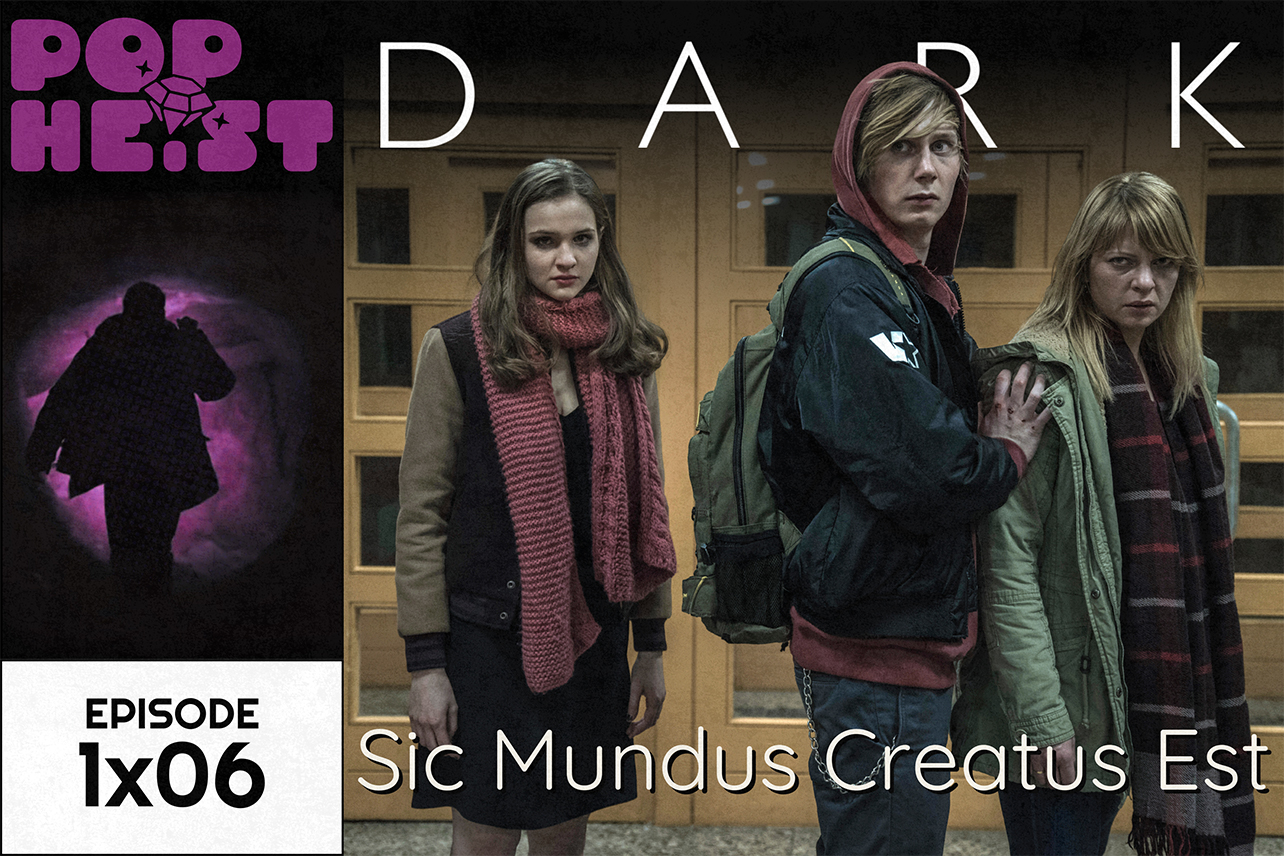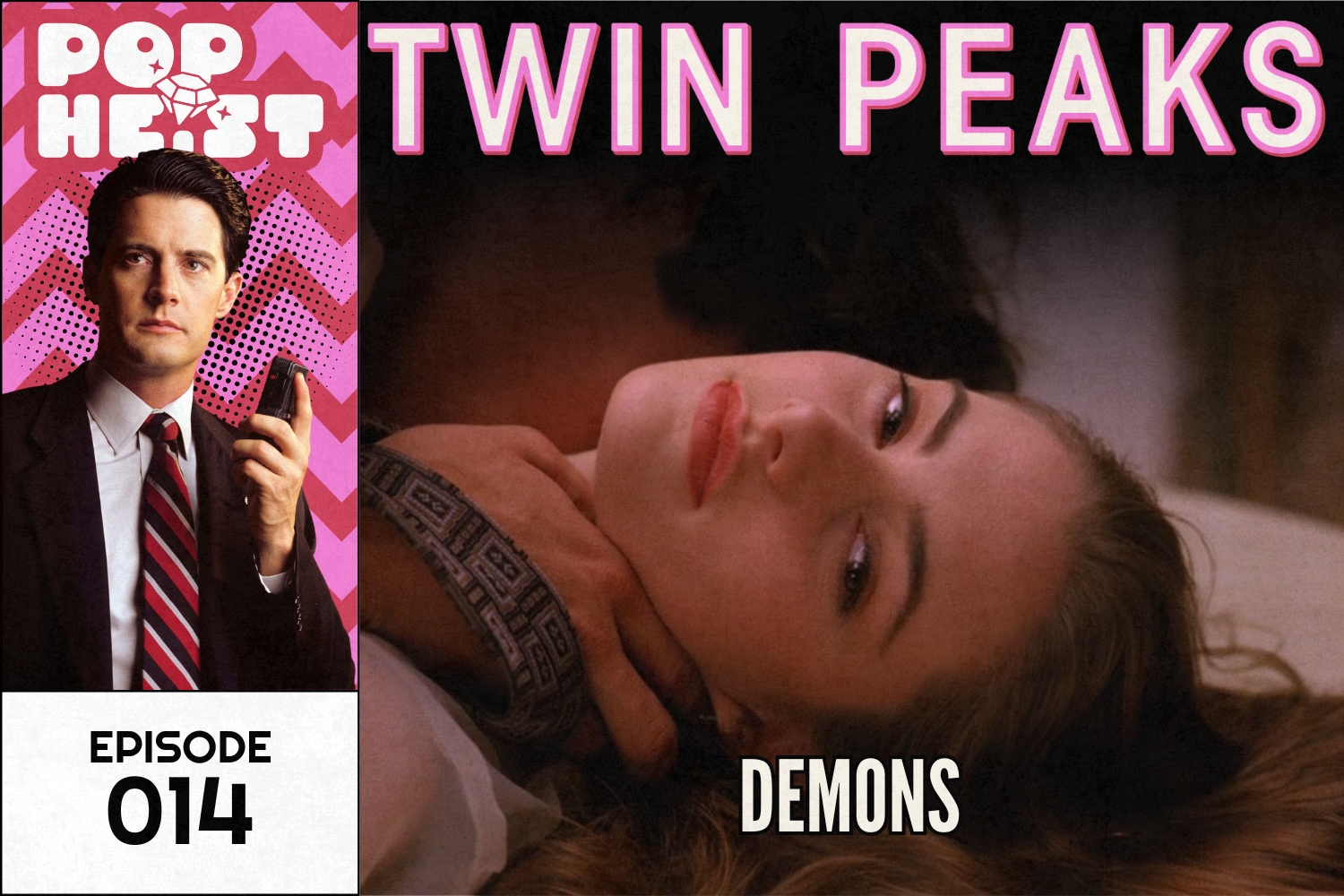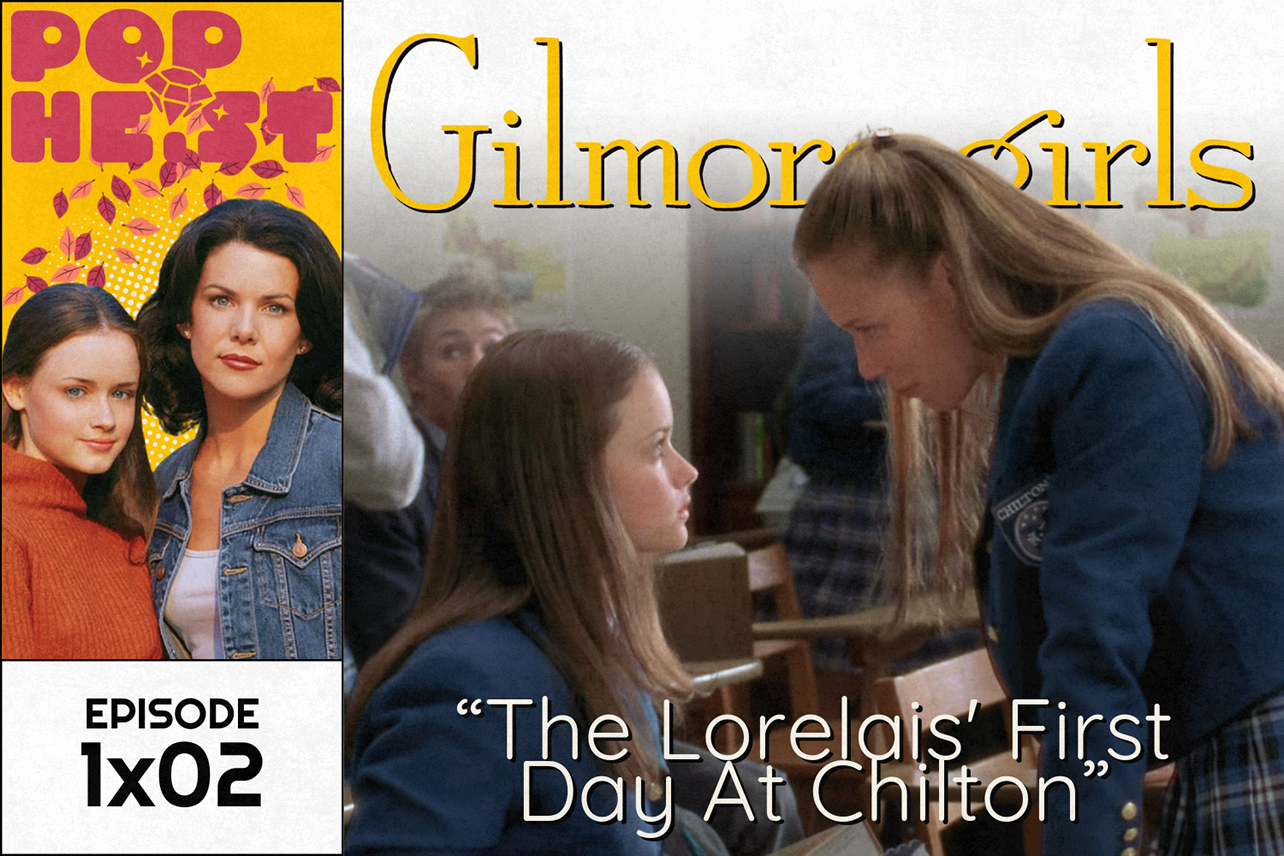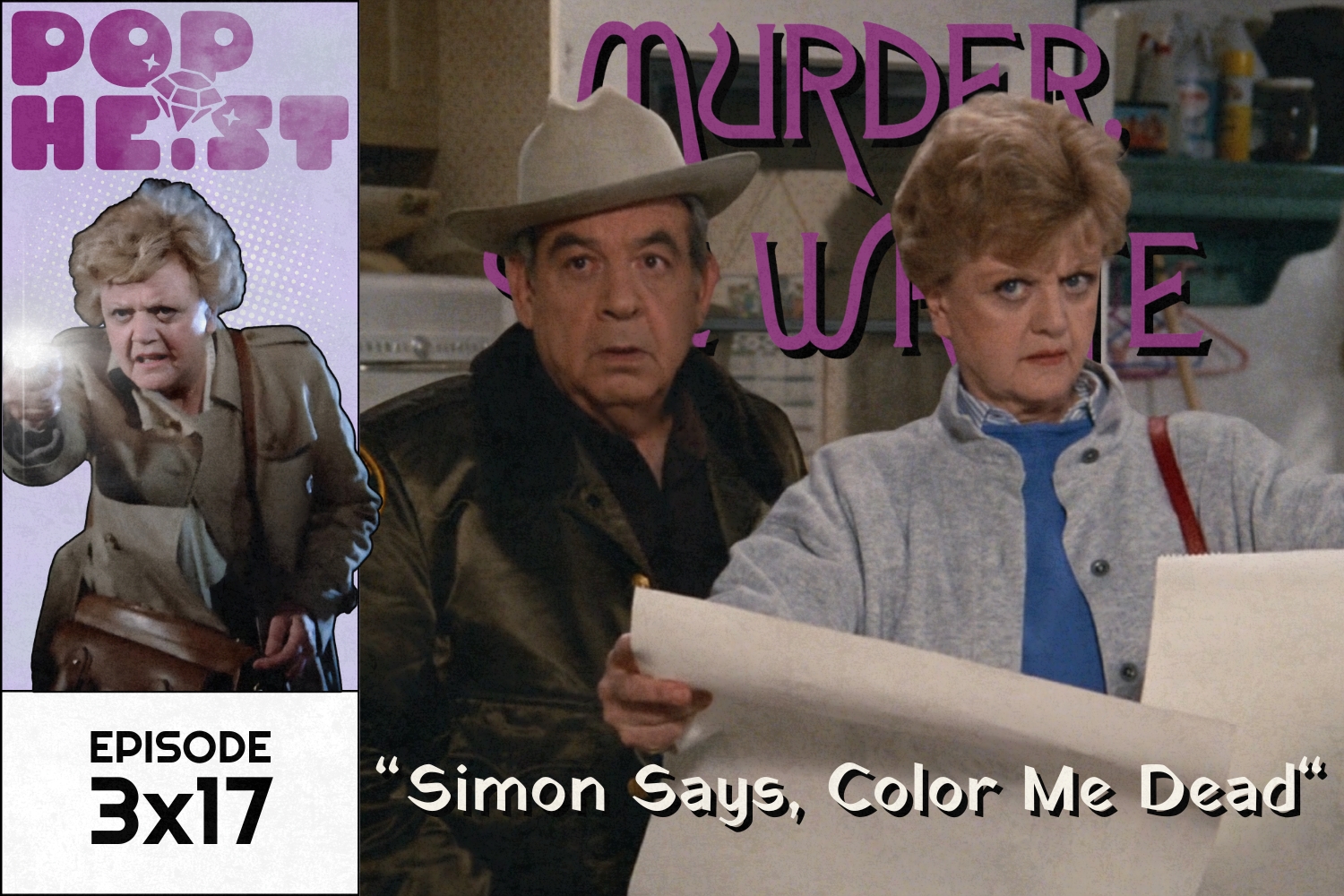Dark Season 1, Episode 6
"Sic Mundus Creatus Est"
Original airdate: December 1, 2017
Writer: Jantje Friese, Ronny Schalk
Director: Baran bo Odar
Cast: Peter Benedict, Karoline Eichhorn, Louis Hofmann, Moritz Jahn, Stephan Kampwirth, Deborah Kaufmann, Walter Kreye, Ella Lee, Paul Lux, Lydia Maria Makrides, Oliver Masucci, Maja Schöne, Tatja Seibt, Jördis Triebel, Lisa Vicari
For five episodes, Dark has charted the decay of Winden. Families splinter. Marriages collapse. Lies corrode trust. Each scene has peeled back another layer of rot, exposing a town suffocating under secrets. Episode 6, pointedly titled "Sic Mundus Creatus Est" ("Thus the world was created"), shifts the focus. This is not simply another hour of watching Winden fall apart. It is about tracing the roots of how it all began.
If the earlier episodes were about symptoms such as missing boys and fractured families, this one is about causes. We return to 1986 and uncover affairs, betrayals, and cover-ups that poisoned Winden decades earlier. We descend into the caves with Jonas, not just wandering in darkness but confronting the literal door marked Sic Mundus Creatus Est. Violence, secrecy, and obsession did not sprout overnight; they were cultivated long ago.
The episode opens with Regina's nightmare. She is tied to a tree, screaming for help, surrounded by noises in the caves. Her waking life offers no comfort, as she later receives her mammogram results. Cancer. Her private diagnosis mirrors the town's public decay. She begs Aleksander to tell her everything is all right. He does. Everything is not all right, at least not in Winden.
Jonas questions his mother about his father. What was Michael like before the depression, before the suicide? She calls him an enigma: "You never knew if he meant something seriously or not." Coming so soon after Jonas read Michael's letter that revealed he is Mikkel grown up, the line lands like a riddle. Was Michael's whole life an act or is the letter a trick?
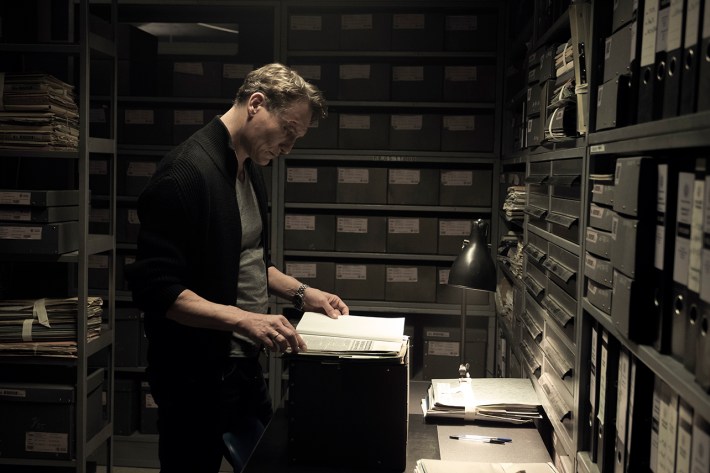
Ulrich pulls old case files on Mads, listening to tapes and retracing his brother's final days. His investigation shifts from Mikkel's disappearance back to 1986, to the night his family was first broken. Jana tells him what she has long concealed: Tronte was not home that night. He was with Claudia Tiedemann. The missing boys, the absent father, the affair: it all connects.
For five episodes, Ulrich has raged against incompetent police work and official negligence. Now he learns the rot started inside his own house. His father's infidelity left his brother unprotected, and the cycle continues. Ulrich's own marriage has collapsed as his son vanished. The sins repeat. At least father and son can agree on one thing: Egon Tiedemann was an idiot.
If Ulrich is confronting the roots of paternal betrayal, Katharina and Marta embody how grief metastasizes across generations. Marta insists Mikkel is dead, voicing the thought no one dares to say aloud. Katharina slaps her.
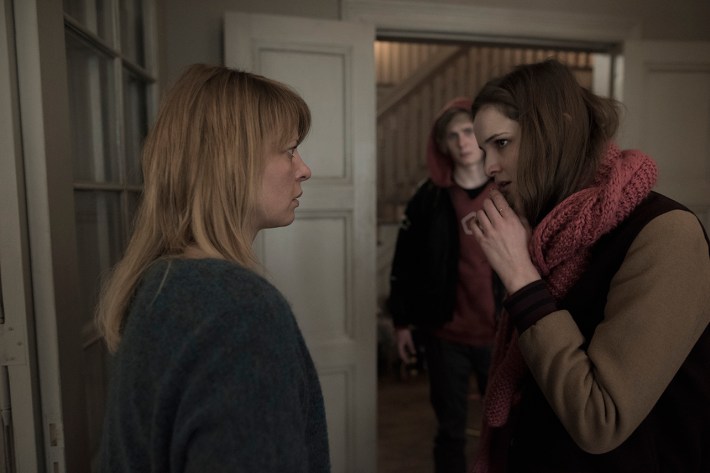
It is one of the rawest family scenes in the series: pain transmuted into violence, mother and daughter locked in a cycle of hurt. Magnus steps in, holding his mother as if to keep the whole family from breaking further apart.
Magnus digs up the box Franziska had buried in the woods, hoping for clarity. Instead, he finds it empty. What he does discover, a mattress, used condoms, and a necklace, only raises more questions. Like the adults around them, the younger generation is already tangled in secrecy and mistrust.
Ulrich confronts Regina at the hotel, pressing her about the past. Did she know their parents were having an affair? Did Mads say anything strange before he vanished? Regina lashes back. She reminds Ulrich that Mads was the only person who never spoke ill of her and that she always wished it had been Ulrich who disappeared instead. It is a brutal moment, and Ulrich retaliates by dredging up the accusation that he raped Katharina in 1986.
Regina throws the truth at him: it was not her who spread the lie, it was Hannah. The girl who "would have done anything" for him. For Ulrich, the revelation collapses decades of mistrust. For us, it confirms a larger theme: lies do not just wound in the present, they rewrite the history of the town itself.
Katharina is still circling the truth of Ulrich's affair. She pores over his phone bill and dials the number he has called over and over. Hannah answers and it's more proof.
Her grief calcifies into fury. Calling a hotline, she delivers one of the show's most damning speeches: "Winden is like a festering wound… Behind one of these doors is my son. It could be anyone. Someone we had over for dinner. Someone who looks after our children." She is not just describing Mikkel's abduction. She is diagnosing Winden itself. The town's sickness is not external. It is inside the homes, in the betrayals everyone has agreed to ignore.
Violence ripples through Winden. Katharina slaps Marta. Later, Katharina attacks Regina in public, forcing Magnus to pull her away. Ulrich confronts Hannah, grabbing her by the throat, raging at her role in destroying his life. "What do you want?" he demands. "You," she replies. He calls her poison and sneers that it is no wonder Michael killed himself. Winden is a cycle of anger and abuse.
Meanwhile, Peter Doppler remains high on the audience's list of suspects. This episode places him in a bunker with Tronte Nielsen. Strange men, in strange circumstances, keeping stranger secrets.
In this episode, Marta delivers her performance in Ariadne, serving as both metaphor and mirror. On stage, she speaks of labyrinths, shadows, and severed threads. Off stage, Jonas follows the literal red string deeper into the caves. Marta sheds her white dress for black and declares, "In death, I am alone. And my only judge is me."
Jonas opens the door marked Sic Mundus Creatus Est. The caves are not just dark tunnels. They are the labyrinth itself, the structure that defines Winden. Jonas's descent is the show's descent into its own origins.
As Marta falters on stage, Katharina gets on stage to comfort her. Regina intercepts them as they are leaving, needling Katharina about dragging her daughter away. Katharina attacks Regina. The Nielsen family is at the breaking point, their grief spilling into rage against anyone in reach.
That same night, Marta and Magnus share a quiet sibling moment. Marta admits she does not know if things will ever be the same. "You do not actually know your parents," she says. "You are a family, but you do not really know anything about each other." It is the simplest, most cutting statement of the episode: family is itself a very real mystery, in this show and in life.
Jonas follows the red string into the heart of the caves. Doors slam behind him. Lights flash. He finds the door, crawls through, and emerges into another time. Like Mikkel before him, Jonas has crossed the boundary.
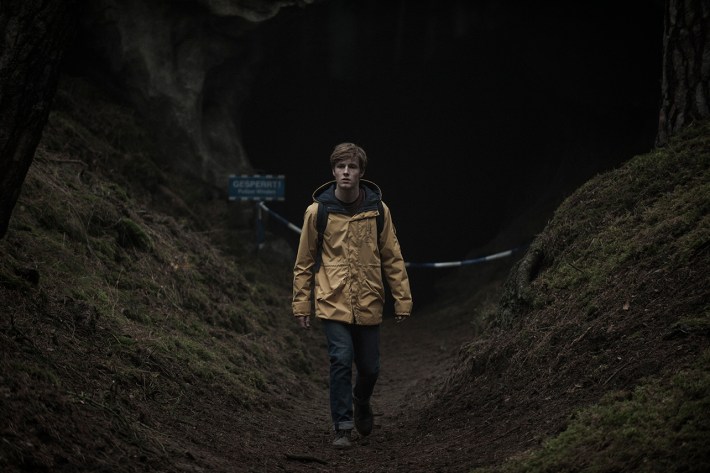
At a bus stop, he is offered a ride by Hannah and her father. He stares at his mother as a child.
The episode closes with the most devastating collapse of past into the present. Ulrich looks at the body discovered in the forest. The chin bears the scar he remembers. It is Mads, his brother, unchanged but dead, returned decades too late.
For five episodes, Dark charted a town in decline. Marriages cracked, lies festered, families broke apart. Episode 6 reframes the story. Sic Mundus Creatus Est insists this is not about a community unraveling in the present. It is about a community long ago corrupted. Winden was sick from its creation, built on betrayals and cycles of violence that repeat every 33 years. Jonas's descent into the caves, Ulrich's confrontation with his father, Katharina's speech about Winden's sickness all point to the same conclusion. The present is only the symptom. The roots run deeper, and they have been rotting for decades.
If the first half of the season was about the mystery of the missing, the second half is about the structure beneath the mystery. The labyrinth is real. The cycle is unstoppable. And Winden's sickness began long before Mikkel disappeared.
This recap was originally accessible to paid subscribers only, and future recaps in this series are available now for paid subscribers. If you haven't already, consider supporting worker-owned media by subscribing to Pop Heist. We are ad-free and operating outside the algorithm, so all dollars go directly to paying the staff members and writers who make articles like this one possible.
